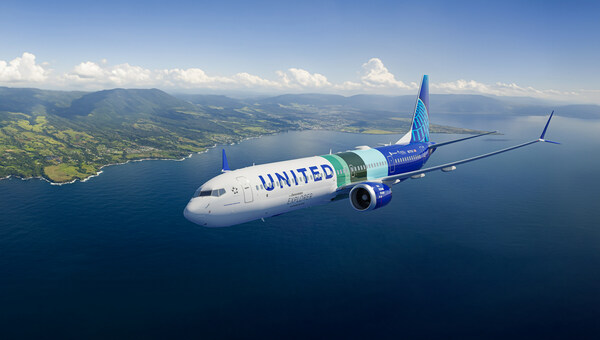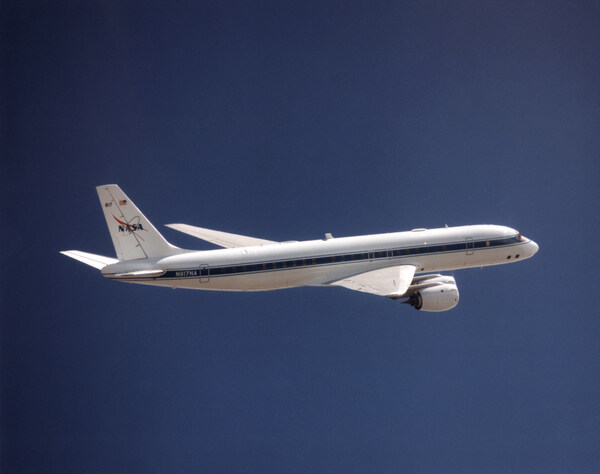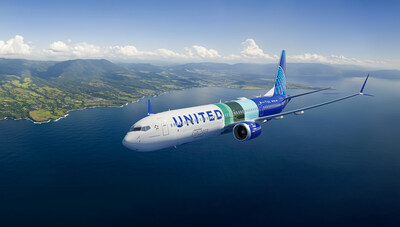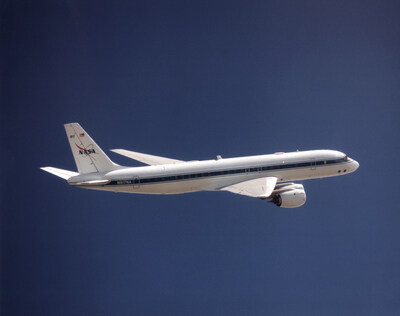EVERETT, Wash., Oct. 12, 2023 /PRNewswire/ -- In a collaboration to strengthen sustainability in aviation, Boeing [NYSE: BA] is partnering with NASA and United Airlines for in-flight testing to measure how sustainable aviation fuel (SAF) affects contrails and non-carbon emissions, in addition to reducing the fuel's life cycle climate impact.
Boeing's second ecoDemonstrator Explorer, a 737-10 destined for United Airlines, will fly with 100% SAF and conventional jet fuel in separate tanks and alternate fuels during testing. NASA's DC-8 Airborne Science Lab will fly behind the commercial jet and measure emissions produced by each type of fuel and contrail ice particles. NASA satellites will capture images of contrail formation as part of the testing.
The researchers aim to understand how advanced fuels, engine combustor designs and other technologies may reduce atmospheric warming. For example, tests will assess how SAF affects the characteristics of contrails, the persistent condensation trails produced when airplanes fly through cold, humid air. While their full impact is not yet understood, some research has suggested certain contrails can trap heat in the atmosphere.
World Energy is supplying SAF for the tests from its Paramount, Calif., facility. Additional support includes:
- U.S. Federal Aviation Administration (FAA) is providing funding through the ASCENT Center of Excellence
- GE Aerospace is providing technical expertise and project funding
- German Aerospace Center (Deutsches Zentrum für Luft- und Raumfahrt or DLR) is providing experts and instrumentation
The project is the latest phase in a multi-year partnership between Boeing and NASA to analyze how SAF can reduce emissions and enable other environmental benefits. Compared to conventional jet fuel, SAF – made from a range of sustainably produced feedstocks – can reduce emissions by up to 85% over the fuel's life cycle and offers the greatest potential to reduce aviation CO2 over the next 30 years. SAF also produces less soot which can improve air quality near airports.
What the test partners are saying:
- "We are honored to collaborate with NASA, United Airlines, and other valued partners on research that will strengthen the industry's understanding of the benefits of SAF beyond reducing carbon emissions," said Boeing Chief Sustainability Officer Chris Raymond. "We've solved hard problems before, and if we continue to take meaningful actions, I'm confident we'll achieve a more sustainable aerospace future, together."
- "Flight testing is complex and resource-intensive, yet it's the gold standard for understanding how sustainable aerospace innovations affect changes in contrails and climate," says Rich Wahls, NASA mission integration manager for the Sustainable Flight National Partnership. "This is why we're bringing NASA's DC-8 to bear on this collaboration, where the valuable flight data will improve our predictive models."
- "This collaboration between Boeing, NASA and United has the potential to not only help us better understand contrails but to provide the full scope of what our transition to SAF can provide beyond greenhouse-gas reductions," said United Chief Sustainability Officer Lauren Riley.
- "We at GE Aerospace proudly support this groundbreaking research collaboration that will deepen our scientific understanding of the impact of SAF on emissions for a more sustainable future of flight," said GE Aerospace Vice President of Engineering Mohamed Ali.
- "To achieve climate-compatible aviation, we need close international cooperation. The German Aerospace Center has decades of experience in research on the climate impact of the entire aviation system by advancing measurement technology and simulations," says Markus Fischer, DLR Divisional Board Member for Aeronautics. "The continuation of transatlantic cooperation now finds a new summit and underlines the international commitment to reduce the climate impact from aviation's CO2 and non-CO2 effects."
The Boeing ecoDemonstrator program was expanded this year to include Explorer airplanes focused on short-term, specific test projects. Boeing and NASA conducted SAF emissions ground testing on an Alaska Airlines 737-9 in 2021 and ecoDemonstrator 777-200ER and 787-10 flight-test jets in 2022. Boeing has committed to deliver commercial airplanes compatible with 100% SAF by 2030.
The 737-10 is the largest airplane in Boeing's single-aisle 737 MAX family, which reduces fuel use and emissions by 20% compared to airplanes it replaces.
As a leading global aerospace company, Boeing develops, manufactures and services commercial airplanes, defense products and space systems for customers in more than 150 countries. As a top U.S. exporter, the company leverages the talents of a global supplier base to advance economic opportunity, sustainability and community impact. Boeing's diverse team is committed to innovating for the future, leading with sustainability, and cultivating a culture based on the company's core values of safety, quality and integrity. Join our team and find your purpose at boeing.com/careers.
At United, Good Leads The Way. With U.S. hubs in Chicago, Denver, Houston, Los Angeles, New York/Newark, San Francisco and Washington, D.C., United operates the most comprehensive global route network among North American carriers and is now the largest airline in the world as measured by available seat miles. For more about how to join the United team, please visit www.united.com/careers and more information about the company is at www.united.com. United Airlines Holdings, Inc., the parent company of United Airlines, Inc., is traded on the Nasdaq under the symbol "UAL".
GE Aerospace is a world-leading provider of jet engines, components and systems for commercial and military aircraft with a global service network to support these offerings. GE Aerospace and its joint ventures have an installed base of more than 40,000 commercial and 26,000 military aircraft engines, and the business is playing a vital role in shaping the future of flight. For more information, visit us at www.GEAerospace.com.
DLR is the Federal Republic of Germany's research centre for aeronautics and space. We conduct research and development activities in the fields of aeronautics, space, energy, transport, security and digitalisation. The German Space Agency at DLR plans and implements the national space programme on behalf of the federal government. Two DLR project management agencies oversee funding programmes and support knowledge transfer.
Contact:
Elisa Hahn
+1 (206)482-4872
elisa.alfstad-hahn@boeing.com
Boeing Media Relations
media@boeing.com
SOURCE Boeing
 USA
USA




